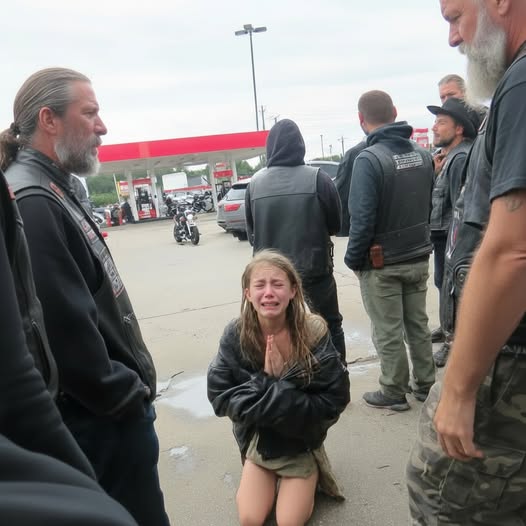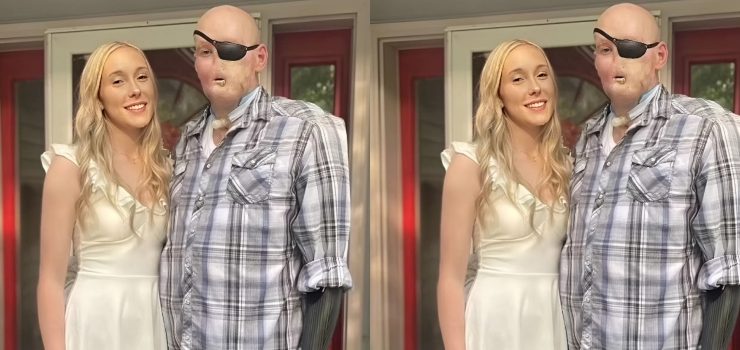At a gas station on Route 42, a scene unfolded that most bystanders misread in an instant. A barefoot teenage girl, no older than fifteen, stumbled from a black sedan that sped away the second she closed the door. She collapsed beside pump three, sobbing so hard she could barely breathe, dressed in a torn outfit and shaking uncontrollably.

Moments later, forty-seven bikers from Thunder Road Motorcycle Club pulled in for gas on their annual charity ride, their engines rumbling as they parked. To anyone inside the station, it looked like a gang surrounding a helpless child, and panic set in. Customers dialed 911, convinced the bikers were kidnapping her, while the station attendant frantically called police. But I was watching from my truck and had seen the truth a few minutes earlier. The girl, whose name we later learned was Ashley, had escaped from traffickers. She was terrified, confused, and desperate for help.
Big John, the seventy-one-year-old leader of the club and a Marine veteran with four daughters of his own, noticed her first. He shut off his bike, approached slowly, and asked gently if she was okay. Ashley recoiled in fear, whispering that she wouldn’t tell anyone if they didn’t hurt her. Instead of closing in, the bikers formed a circle around her with their backs facing inward, creating a protective wall. Tank, their road captain, offered his leather jacket against the cold and backed away. Ashley grabbed it and pulled it tight, finding comfort in the gesture. While the people inside saw only a threatening image, what was happening outside was entirely different.
The bikers were shielding her, trying to calm her down. Big John asked her name, and she told them she was Ashley, from Millerville, two hours away. Through sobs, she admitted she had been tricked by a man online who pretended to be her age. He had taken her to a house where other men waited, but she escaped when a pizza delivery driver knocked on the wrong door. She stole his car and drove until it ran out of gas, only to be picked up again and dumped at the gas station.
The bikers understood immediately, their faces hardening at her words. John called his wife, Linda, and their daughter Sarah, a social worker who specialized in trafficking victims. Before help could arrive, police cars swarmed the scene. Officers jumped out, weapons ready, ordering the bikers to move away from Ashley. She cried out that they were protecting her, not hurting her, but her voice was drowned out by shouted commands.
The bikers dropped to their knees, hands behind their heads, unwilling to escalate the confrontation. I stepped forward and told Officer Daniels, the youngest of the group, that I had seen everything and that the bikers were innocent. But the police weren’t listening. All forty-seven men were handcuffed as news crews filmed what they thought was a kidnapping. It took Ashley’s desperate protest from the back of a patrol car to shift the tide. Sergeant Martinez, one of the officers, checked Big John’s phone and confirmed he had indeed called his wife and daughter to help Ashley. Slowly, the truth unraveled.
Martinez ordered the bikers uncuffed and turned her attention to Ashley, who gave details about the car, the house, and the men inside. With the bikers’ help, police located the sedan at a rundown house. Inside, they rescued seven trafficked girls between the ages of fourteen and seventeen. The narrative flipped instantly. Instead of a dangerous gang, the Thunder Road MC were hailed as heroes who had saved lives. Ashley later testified in court, wearing Tank’s jacket that she had been told to keep. She described how the bikers had made her feel safe, how they had treated her like a daughter, and how they had risked arrest to protect her. Video evidence from Big John’s helmet camera sealed the traffickers’ conviction.
In the months that followed, Ashley and her mother invited all forty-seven bikers to their home for dinner, where the neighborhood saw leather-clad riders not as threats but as fathers, veterans, and protectors. Ashley herself got a new jacket embroidered with “Protected by Thunder Road MC,” symbolizing her bond with the men who had saved her. Today she is in college, studying social work to help others like her. The club continues their charity rides but now partners with Sarah’s organization, supporting trafficking victims and helping rescue dozens more girls.
Even Officer Daniels, the cop who nearly arrested them, eventually bought a Harley and joined their rides, admitting he had learned the difference between looking dangerous and being dangerous. At the gas station where it all began, a plaque now reads: “On this spot, 47 heroes proved that angels wear leather.” Each year, the bikers and Ashley return to that place, honoring the moment that changed everything. She calls them her guardian angels, but Big John always reminds her that she is theirs too, because she reminded them why they ride—to protect those who need it, no matter how the world sees them.





